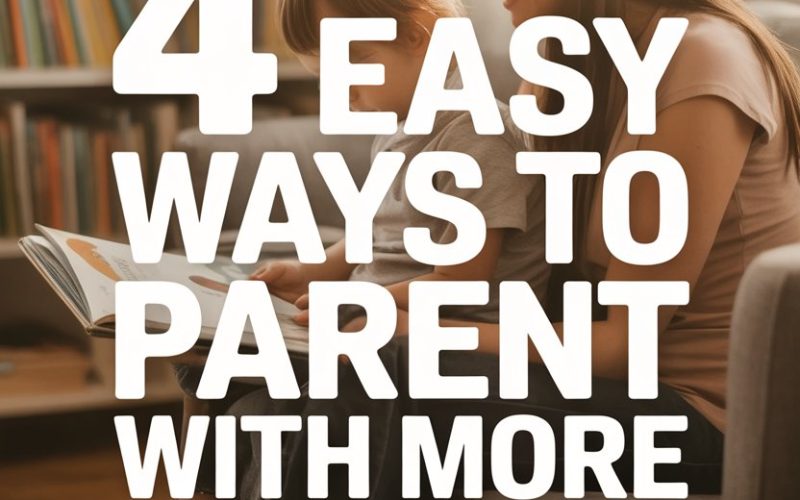If you’ve ever hidden in the loo just to get three minutes of quiet, you are in the right place. Parenting is a beautiful, messy, loud, and—let’s be honest—sometimes chaotic gig.
But peace isn’t just for monks or people with kids who naturally enjoy sitting still. Even the busiest families can find a little more calm at home.
Here are four gentle changes that can bring more peace into your parenting, starting tonight—yes, even if your living room currently resembles a toy tornado recovery zone.
1. Embrace the Power of Saying No
Anyone else feel like the family calendar is auditioning for Cirque du Soleil?
Between school, sports, playdates, and “optional but highly encouraged” events, it’s no wonder parents are frazzled.
Here’s your permission slip: You do not have to do it all. In fact, saying no is a gift to your family—a gift of time, space, and sanity.
Researchers from the University of California have shown that overscheduling kids leads to increased stress for everyone, not just the little ones.
Start by blocking out at least one evening a week for absolutely nothing. That’s right: nothing.
No ballet, no birthday parties, not even a “quick” trip to the supermarket. Give everyone a chance to breathe and reconnect.
When you’re tempted to add another commitment, ask yourself: is this nourishing our family, or just making us busier? Most importantly, model for your children that it’s not only acceptable to protect your time, it’s healthy.
And if Granny kicks up a fuss about missing yet another family lunch? Blame it on your new “family peace policy.” (Granny may grumble, but she’ll get used to it.)
2. Try Micro-Moments of Mindfulness Together
The word “mindfulness” tends to conjure images of serene yogis or apps you never actually open. Good news: Mindfulness for families can be both practical and—dare I say it?—enjoyable.
Psychologists recommend weaving in micro-moments of mindfulness, those tiny pauses that help everyone catch their breath. A few seconds of deep breathing before dinner.
A silly “five senses” check when things feel tense (What can you see? Smell? Hear? Taste? Touch?). Even toddlers can get involved, and it’s much more fun than you might think.
Research published in Child Development found that regular mindfulness exercises can improve emotional regulation in young children and reduce parental stress.
And you don’t need to clear your schedule or meditate on a mountain top: just a minute or two at snack time, in the car, or before bed.
No incense required. Pajamas optional. Bonus points if you can get your partner to join in, even if their deep breathing sounds suspiciously like snoring.
3. Make Peace With Mess—And Lower the Bar
Raise your hand if you’ve ever felt personally victimized by the phrase “enjoy every moment.” Whoever invented that clearly never stepped on a Lego at 2am or scraped week-old Weetabix off the sofa.
A peaceful home does not mean a spotless one. Research from Indiana University actually found no connection between immaculate homes and happier families.
In fact, high standards for tidiness can spike everyone’s stress—especially if you’re the only one who seems to care if socks ever meet the hamper.
Aim for “clean enough.” Create a few simple routines that work for your crew (like a five-minute “pick up whatever you can carry” session before dinner). Then let the rest go.
The world will not end if the beds are unmade or the laundry multiplies overnight. Your children will remember how it felt to be at home, not whether the skirting boards were dusted.
If relatives drop by unannounced and gasp at the chaos, just tell them you’re fostering creativity. Or blame the dog. Even if you don’t have one.
4. Connect Before You Correct
If you feel like you spend all day refereeing arguments, repeating instructions, or issuing timeouts, you’re not alone. It’s exhausting.
Here’s a tiny shift with big impact: connect with your child before trying to correct their behavior.
Seems simple, but it’s backed by years of parenting research—including work by Dr. Dan Siegel—showing that children are more receptive to guidance when they feel seen and understood.
Next time your child’s inner gremlin emerges, pause for a beat. Get down to their level, make eye contact, and acknowledge their feelings. “You’re really upset your tower fell.”
Once they feel heard, they’re far more likely to listen to what you need (“Let’s build it again together—after we move it off the cat”).
This doesn’t mean you become a pushover or let chaos reign. It means your child learns that home is a safe place for all their feelings—even the tricky ones.
And you waste less energy repeating yourself, which means more energy for… well, anything else.
No need for grand speeches or dramatic interventions. Just a moment to connect, then gently guide.
Peace, One Sticky Fingerprint at a Time
Perfection isn’t on the menu—never was, never will be. What’s available? A bit more peace, for you and your family.
Start small. Say no when your calendar groans. Try a family sigh-and-stretch before dinner. Lower the laundry bar. Look your child in the eye before you launch into lecture mode.
None of these steps require superhuman patience or a personal assistant. Just a willingness to let a little more ease sneak into your days.
And if all else fails? There’s always the loo. (Just don’t forget to lock the door.)




